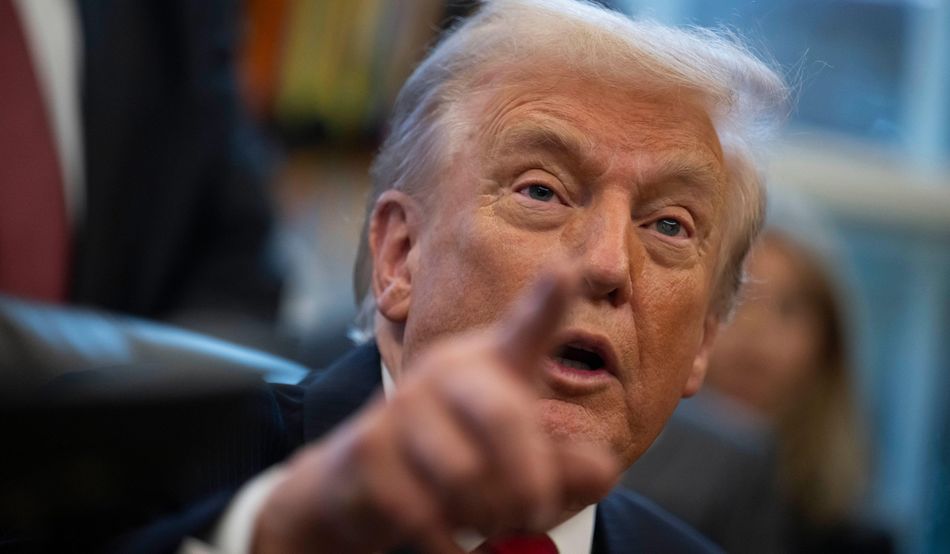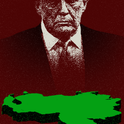There’s one way the BBC could retrieve some dignity from the smoking rubble of the past week. It should send Donald Trump a four-word reply to his blustering threat to sue the corporation in Florida for $1bn in damages: “See you in court.”
There’s barely a notable news organisation in the US that Trump hasn't yet sued. ABC News and CBS News have demonstrated the resolve of a jellyfish in stumping up millions to settle lawsuits that were, in the view of most lawyers, perfectly defensible.
That leaves a $10bn claim against the Wall Street Journal for revealing a lewd scribble Trump allegedly penned to Jeffrey Epstein and a $15bn suit against the New York Times for engaging “in a decades long method of lying about your Favorite President (ME!), my family, business, the America First Movement, MAGA, and our Nation as a whole”. He’s even suing the Pulitzer Prize Committee for giving the NYT a gong.
The BBC should shame the American broadcasters for their spineless capitulation by refusing to be bullied into abject apologies or donations to Trump’s presidential library. The corporation made an error. It has (belatedly) corrected it. It has expressed regret. Now move on.
If Trump had dared to sue in an English court (he can’t because he’s left it too late), the BBC could have replied with the coded response occasionally used by Private Eye: “We refer you to the reply given in the case of Arkle v Pressdram.”
This refers to a 1970s libel threat from a businessman named Arkle. The magazine considered the claim so preposterous that it replied: “Dear Sir, Fuck off, Yours Private Eye.”
But the joke is a little too esoteric for Trump and his lawyers, so “See you in court” would do just as well.
Trump’s first problem is that, according to the BBC, Panorama is not actually available in the US and neither is the BBC iPlayer—unless you're using a VPN in a naughty way, which you might not want to ventilate in a court of law. So, what’s the damage?
Then there’s the problem that the US media is protected from liability when reporting on public figures by the landmark 1964 case of NYT v. Sullivan. In that case, a remarkable judge, Justice William J Brennan, essentially gave American journalists the right to be wrong, so long as erroneous statements about public figures are honestly made.
Brennan referred to “the pall of fear and timidity” that the routine prospect of legal actions would have on journalists. He ruled: “Debate on public issues should be uninhibited, robust and wide open and… it may well include vehement, caustic and sometimes unpleasantly sharp attacks on government and public officials.”
There are no higher public officials than the president, so unless Trump could demonstrate that a BBC editor deliberately set out to damage him by splicing together two different parts of a speech, it’s difficult to see how he could succeed.
Sullivan is under more ideological and rhetorical pressure than it has been in decades, and at least two justices want to revisit it, but the Supreme Court has not yet taken any concrete step to weaken it. The governing rule remains precisely what it has been since 1964.
Was the film misleading? In the narrow sense of a bad edit, yes. That was unprofessional and wrong. But was it materially misleading in the sense of overstating Trump’s role in urging on the crowd as they headed to Capitol Hill on January 6th 2021? Several congressional and legal authorities could be cited by the BBC in its defence.
The veteran BBC Panorama reporter John Ware has been using the archives of the Daily Telegraph—the paper which has accused the BBC of “materially misleading” editing—to demonstrate a degree of hypocrisy.
He quotes the Telegraph’s own chief reporter, Robert Mendick, on 7th January 2021: “Trump threw on the whole, messy heap a burning match. And throughout the day he kept throwing on more. A clenched fist, and a call for action.”
Ware moves onto the former prime minister as quoted in the Telegraph on 8th January: “BORIS JOHNSON has ‘unreservedly condemned’ Donald Trump for encouraging protesters [Ware’s emphasis] who stormed the Capitol building in Washington DC. The Prime Minister said the US president had been ‘completely wrong’ to cast doubt on the outcome of the election and to encourage the ‘disgraceful’ behaviour that resulted in four deaths…”
Then Ware quotes the Telegraph’s own columnist Ambrose Evans-Pritchard on 8th January: “The putsch has failed….the desecration of Capitol Hill by Trump mobs—on explicit incitement by the president [his emphasis]—speaks for itself.”
For good measure, he adds the Telegraph’s own Ben Riley-Smith on 13th January, referring to Trump's “incendiary speech to supporters" prior to the “mob that stormed the US Capitol last week”.
It would be amusing for the BBC to use the Telegraph’s own reporting to bolster the case that Trump did, indeed, bear significant responsibility for the carnage that followed his speech. Indeed, numerous rioters subsequently testified that they had been motivated by Trump’s words.
All in all, Trump doesn’t have much of a case and if BBC chair Samir Shah has any sense, he’ll announce that not a penny of licence fee payers’ money will go to furnishing the Donald J Trump Library.
Show the Americans what a British backbone is made of! Show weaselly US broadcasters how it’s done! Even Nigel Farage should cheer that on.













